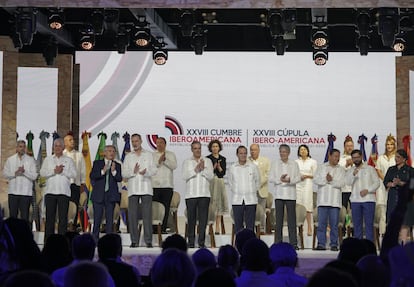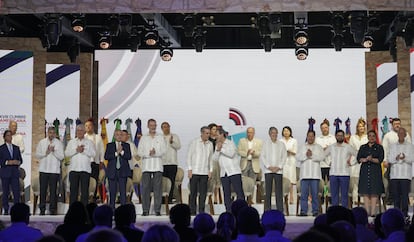Ibero-American Summit focused on ‘results that have a positive impact on quality of life’
The meeting in the Dominican Republic aims to lay the foundations for cooperation between Latin America and Europe ahead of the Spanish presidency of the EU Council

The XXVIII Ibero-American Summit being held this weekend in the Dominican Republic kicked off Friday night with the objective of seeking “concrete results that have a positive impact on the quality of life of Ibero-Americans.” Former Chilean foreign minister Andrés Allamand, head of the Ibero-American Secretariat, called on the 22 countries that comprise the bloc to take advantage of the regional context which, he underlined, “as seldom before mixes opportunities and challenges.” One of these opportunities, Allamand said, is the upcoming Spanish rotation of the presidency of the Council of the European Union, from July to December 2023. Allamand described Madrid’s presidency as an opportunity to generate an agenda for the future between Latin America and Europe “to work together to solve problems such as climate change, which is an existential threat to humanity.” The upcoming meeting of the Community of Latin American and Caribbean States, convened for July 17 and 18 in Brussels, will finalize a package of European investments in the region, as announced by Spain’s King Felipe VI in Santo Domingo on Friday.
The challenges posed by climate change are one of the main themes of the summit’s agenda, which is being held under the slogan “Together for a fair and sustainable Ibero-America.” The meeting of presidents, heads of state and senior ministers aims to approve three documents: An Ibero-American Environmental Charter (also known as the Green Pact), an Ibero-American Charter of Principles and Rights in Digital Environments and a strategy related to food security. A central proposal on international financial architecture, which was ultimately aimed at market reform to facilitate access to credit, was dropped at the last minute. The lack of consensus due to the opposition of some countries, such as Cuba, stalled the debate on that topic, according to diplomatic sources. Cuban President Miguel Díaz-Canel was one of the 11 heads of state who shared the stage at the inauguration of the summit with its host, Dominican President Luis Abinader, King Felipe VI, Chile’s Gabriel Boric, Argentina’s Alberto Fernández, Bolivia’s Luis Arce and Honduras’ Xiomara Castro, among others.
The summit has also been marked by absences, delays, expectations, and speculations. Brazil’s Inácio Lula da Silva and Mexico’s Andrés Manuel López Obrador, presidents of the two Latin American giants in terms of GDP and population, did not travel to the Dominican Republic for different reasons: the former due to a scheduled visit to China and the latter because of his misgivings about international forums. Colombia’s Gustavo Petro did not attend the summit’s opening ceremony after delaying his departure from Cartagena, while Spanish Prime Minister Pedro Sánchez, who was traveling with the European Union’s High Representative for Foreign Affairs Josep Borrell and Portuguese Prime Minister António Costa, landed at the last minute.

Speculation over the participation of Venezuelan President Nicolás Maduro — who in 2021 monopolized the limelight in the days leading up to the Ibero-American Summit in Andorra and finally left the conference in the lurch — became entangled as the hours went by. Earlier in the week, Maduro had confirmed his attendance. Later, the option was floated of the Venezuelan leader being represented by his Minister of Foreign Affairs, Yván Gil, who arrived in Santo Domingo and joined the inauguration to deliver “President Maduro’s message for the unity of Our America and the Greater Caribbean.” But it was also rumored Maduro was among the leaders who were about to arrive. However, the name of Colombian President Gustavo Petro was omitted by the host during the summit’s inauguration, generating some confusion. It has not been ruled out that Maduro may arrive shortly before the day’s meetings commence on Saturday. But equally, nobody has ruled out the Venezuelan leader electing to sidestep the conference, which seeks to lay the foundations for cooperation beyond political differences and ideological clashes, despite having confirmed his presence.
In his opening remarks, Abinader noted that the Ibero-American community faces “common challenges that require collective responses,” and invited the participants to enter into dialogue “sincerely and amicably.” At the Ozama Fortress in Santo Domingo — the first military construction built by Spain in the Americas — the Dominican President received the heads of state attending the summit. Among them were Fernández, who a week ago underwent surgery for a herniated disc, and Ecuadorian president Guillermo Lasso, who also arrived with the aid of a walker due to a lumbar cyst.
Chilean President Gabriel Boric was greeted with a generous round of applause and began the meeting seated next to his Bolivian counterpart, Luis Arce. The two presidents did not speak to each other, although they have shown a certain willingness to discuss points of contention between their countries, particularly over a territorial dispute dating back to the 19th-century War of the Pacific, in which Bolivia is demanding an access route to the Pacific Ocean lost during the conflict.
Sign up for our weekly newsletter to get more English-language news coverage from EL PAÍS USA Edition
Tu suscripción se está usando en otro dispositivo
¿Quieres añadir otro usuario a tu suscripción?
Si continúas leyendo en este dispositivo, no se podrá leer en el otro.
FlechaTu suscripción se está usando en otro dispositivo y solo puedes acceder a EL PAÍS desde un dispositivo a la vez.
Si quieres compartir tu cuenta, cambia tu suscripción a la modalidad Premium, así podrás añadir otro usuario. Cada uno accederá con su propia cuenta de email, lo que os permitirá personalizar vuestra experiencia en EL PAÍS.
¿Tienes una suscripción de empresa? Accede aquí para contratar más cuentas.
En el caso de no saber quién está usando tu cuenta, te recomendamos cambiar tu contraseña aquí.
Si decides continuar compartiendo tu cuenta, este mensaje se mostrará en tu dispositivo y en el de la otra persona que está usando tu cuenta de forma indefinida, afectando a tu experiencia de lectura. Puedes consultar aquí los términos y condiciones de la suscripción digital.








































